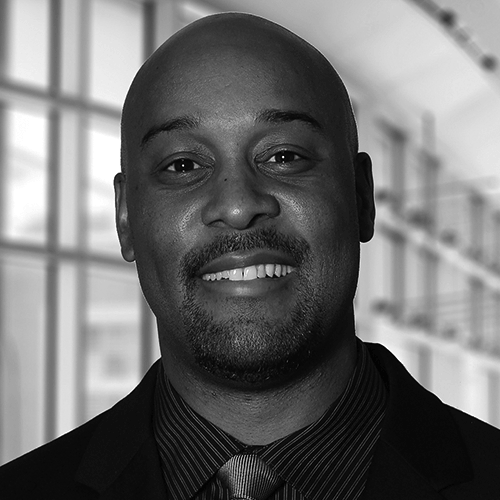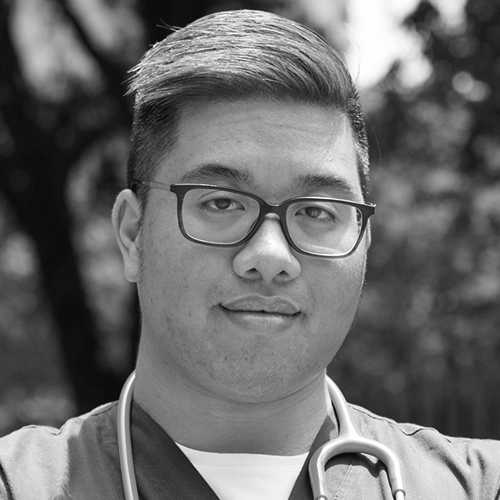Four men in the nursing industry share how their education has prepared them for challenging and diverse careers in a field they love.

Eric Vachon, Ph.D.
Candidate, Michigan State University
What inspired to you to pursue a career in nursing?
I have always had an affinity for science, specifically studying the human body. I enjoy learning how the human body works both physically and mentally. When deciding what to choose as an undergraduate major, nursing stuck out as the obvious choice. Nursing also gave me the opportunity to have an immediate impact on the lives of others. Through my work as a registered nurse and a nurse researcher, I have been able to continue my passion of helping others while continuing to learn about the physical and mental health of my patients.
How has your education better prepared you to enter the field of nursing?
For my Bachelor of Science in Nursing, I attended Hope College, a small, Christian liberal arts college. Nursing is a holistic discipline in that we treat the mind, body, and spirit. I believe that my diverse experiences at Hope College prepared me to effectively care for every aspect of my patients’ health.
In pursuing my Ph.D. at Michigan State University, I have begun to answer some of the questions I believe need to be answered in nursing and healthcare. I chose to pursue a career in research in order to have a larger impact by improving the lives of my patients. My current research is with those battling cancer, and I am committed to making their daily fight a little bit easier.
What’s the biggest misconception about your job?
Most people imagine researchers sitting in a laboratory, closed off from the rest of the world. This belief is no different with nurse researchers. Those considering a career in nursing research believe they will lose their patient contact by leaving the bedside, but this is not the case. Although my interactions with patients are different as a researcher from when I practice as a registered nurse, I have been able to work with patients in a variety of ways. The majority of data we collect as nurse researchers is a result of directly working with patients.
What’s one piece of advice that you would give a male student who is on the fence about nursing?
Please do not buy into the stigma. Although more men are continuing to make their way into the nursing profession, the stigma still exists for some, likely due in part to the classic movie “Meet the Parents.” For males considering going into the nursing profession but worried how they may be perceived or that they cannot be as effective caregivers as women, I would encourage them to talk with other men in the field. In my first job after nursing school, I was fortunate enough to work on a unit with a substantial number of males. We were all proud to be men in nursing, and we loved being part of the profession. I have had female patients refuse to have me as a nurse for certain reasons, but these were rarities. I have never felt patients believed I could not be a caring nurse because I am male. There are so many opportunities in this profession, and more men need to take advantage of them.
What’s one challenge that you have overcome as a Ph.D. student/candidate?
Your status in the research community is often based on the number of years you have put in and what you have accomplished. Starting my Ph.D. at the age of 23 with no master’s degree, I felt that it was going to be difficult to earn respect in the discipline and the cancer field. At first, it was difficult. Thankfully, my mentors provided me with opportunities to accomplish some of my goals and gain respect in the nursing field and cancer research. After just a few short years, when I am attending a national conference and talking with another researcher who has been in this field for longer than I have been alive, I feel confident in my work and the way I speak about it. I believe having confidence as a student or early-career researcher goes a long way in gaining the respect of more experienced colleagues.
What’s the most rewarding part about being a nurse?
As I know is the case with many in the nursing field, the most rewarding aspect for me is the genuine gratitude from patients and family members. Whether you are working as an RN, a nurse researcher, or anywhere in between, we work long, difficult hours that can leave us burnt out and struggling to return the next day. However, the smile of a patient after bringing them an extra glass of water or having a patient thank you for taking the time to listen to them makes all the difference in the world. I have patients I will never forget, both in my clinical practice and research, because of the connection I made with them and their genuine appreciation for what I did. These moments with patients and family members are the reasons nurses continue to love what they do.

Reginald Pryear
Online Doctor of Nursing Practice Alumnus, Ohio State University
What inspired to you to pursue a career in nursing?
For as long as I can remember, I have been intrigued by the body and its mechanics. I spent several years in college working as a nurse’s aide, and I truly enjoyed interacting with every patient and learning their story. With my knowledge and skill set I was able to directly impact their overall health and quality of life. It was then that I realized my passion was nursing, and I have never looked back.
How has your education better prepared you to enter the field of nursing?
I have always known my education would continue after obtaining my Bachelor of Science in Nursing. While I spent the first six years of my nursing career taking care of patients at their bedside, I knew I eventually wanted to make my way into management. Higher education is essential to the advancement of a nursing career, and I have been fortunate enough to take advantage of several opportunities which have been valuable in my development as a nurse and leader. My Doctor of Nursing Practice (DNP) from Ohio State University is the most influential formal education I have received to help me develop and achieve my future career goals. More to the point, the Nurse Executive Track of the DNP has enhanced my development of evidence-based practice and will support my leadership roles in the future. Obtaining my DNP has also provided me with additional knowledge and tools to lead and empower others and guide them in fulfilling their own goals.
What’s the biggest misconception about your job?
I think the biggest misconception about my job is that nursing is “easy.” While there are certain nursing skills that can be taught, a nurse must inherently care for people and want to improve their lives. Successful nurses are also extremely detail-oriented and can think critically through complex situations. They must be able to multi-task, perform well in a team and be willing to coach and train newer nurses while on the job. Achieving all of this while taking care of your patient whose health is in your hands is not for the faint of heart.
What’s one piece of advice that you would give a male student who is on the fence about nursing?
One piece of advice I would give to a male student, or any student on the fence about nursing, is to obtain hands-on experience in the medical field before enrolling in nursing school. Students can gain this experience by shadowing nurses in various settings or even working in a clinical area. I would also tell them to ignore the stereotypes of male nurses. Historically, male nurses were a minority in the field, but that has been changing for some time. Nursing is a stable, high-paying, high-adrenaline career path that can provide so many opportunities if given the chance.
What’s one challenge that you have overcome as a Ph.D. student/candidate?
The Associate Chief Nursing Officer for Ambulatory Services is a new role for Ohio State and a new role for nursing across the country. I am responsible for developing the scope and standards of nursing practices across all ambulatory clinics while also ensuring clinical staff are performing at the highest level based on their position description and/or licensure. I am also responsible for assessing current ambulatory strategies and operations to determine nursing priorities for growth and expansion into new markets. I think utilizing nurses to the top of their licensure and skills in the ambulatory setting has been challenging but also extremely rewarding.
What’s the most rewarding part about being a nurse?
The most rewarding part about nursing is the variety of ways I can carry out my passion while working in this field. I have been fortunate enough to do this while working as a clinical staff nurse, an outreach coordinator educating families and currently in management as I develop new structures and processes to continually improve the quality of care for patients. Nurses are always learning and adapting, and every position I have held as a nurse has taught me different yet equally important ways to positively impact a patient’s life.

Kevin Primacio
Senior, University of Texas at Arlington
What inspired to you to pursue a career in nursing?
I come from a family of nurses. My mother’s a nurse, and I have two aunts and five cousins who are nurses. Being around them and listening to their stories and experiences inspired me to become a nurse. My mom and one of my aunts were particularly influential in shaping my career choice. When I was growing up in Guam, my mom worked in a clinic. I saw how passionate she was about what she did. She would ask questions, take vital signs, give the patients guidance and steer them in the right direction regarding the doctor’s instructions and any referrals they needed. When I was in middle school, one of my aunts was the school nurse. She gave me the option of being her assistant. I got to take vital signs and assist her with whatever else she needed, including getting ice packs, band-aids and antibiotics. That was my first introduction to work, and that was when I decided I wanted to be a nurse. I’ve never wanted to be anything else.
How has your education better prepared you to enter the field of nursing?
At UTA we get a lot of hands-on experience, including inserting IVs, correctly taking vital signs and learning how to do wound care. UTA has also prepared me well in the delivery of holistic care and patient safety. I believe the education I’ve received at UTA is superior. The nurses at the various health care centers where we do our clinicals say as much. They say they like UTA students because we know what they’re talking about, because we’ve been taught well beforehand and because we come there prepared.
What’s the biggest misconception about your job?
There’s still a perception out there that nursing is a woman’s profession. Sometimes you hear people say men should be doctors instead of nurses. It’s true that nursing remains a female-dominated profession, but more men are entering the field. The reality is nursing is a huge umbrella field. It has so many specialties, some of which are more likely to attract men. For instance, you typically see more men working as nurse anesthetists.
What’s one piece of advice that you would give a male student who is on the fence about nursing?
Connect and network with other nursing students to gain more insight about the nursing field. Explore your options within the profession and familiarize yourself with the various specialties. There are so many of them, and you just might find one you like. At first, I thought I wanted to specialize in nursing informatics, but when I started doing my clinicals, I got a chance to work in the cardiac unit and fell in love with the patients and the kind of work that’s done there. Also, get involved with a nursing student organization. At their meetings, they typically have guest speakers who are professional nurses. They talk about nursing and what got them into it.

